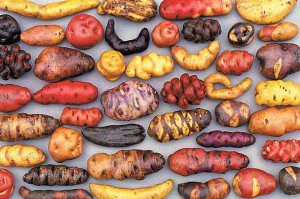Guest Writer for Wake Up World
Potatoes are one of the worlds most popular foods. It ranks right up there with wheat and corn. Originally a Peruvian vegetable it has been shown to be a valuable food source for over 6,000 years.
Most of us have mashed, baked, fried, scalloped and simmered these tubers into innumerable dishes. Almost 60% of all potatoes grown are used in processed foods such as bagged chips and french fries. Almost 40% is what is purchased and brought home to prepare into meals and a small percentage is left over to use as seed potatoes.
It has been villified due to its high toxicity if eaten incorrectly. The stem and leaves have a high concentration of glycoalkaloid poison which can also be in the potato itself, especially if you see the potato having any green on it. At high enough levels the glycoalkaloid found in potatoes known as solanine can cause irritation of the gastrointestinal tract and impairment of the nervous system. Don’t eat the green ones and you will be just fine.
Many experts believe that potatoes are a “feel good” food that raises the level of the neurotransmitter serotonin in the brain. This is suppose to decrease the likelihood of depression, binge eating and insomnia. And as a whole food it is considered beneficial to those who want to maintain a healthy weight. We’re not talking deep fried potatoes here which are lethal to our health in many ways and the wrong food choice, period.
Conventionally grown potatoes are a nightmare of chemicals though and you would be prudent to look for organic options.
I know that here in Australia substantial amounts of potatoes are grown on deficient soil and the use of nitrogenous and superphosphate fertilisers is a common practice. The crop yields years ago were only half of what they are today even with the fact that the area used for crops has diminished dramatically over this time span. The increased productivity is mainly due to the aforementioned fertilisers, better irrigation and higher yielding varieties.
There were huge issues raised in regards to potatoes used in rotation with sheep and beef grazing several years ago. The pesticides used in the potato crops were showing up in the beef! There was even a ban placed on exporting the contaminated meat.
Potatoes are treated throughout their life starting with treating the soil before the potato is even planted. Many of the substances used in Australian farming are banned in other parts of the world. Movento is one brand that was banned due to toxicity to bees. There is not enough research yet apparently to determine the effects on humans. All I know is, If it effects one living creature it effects all of us. Honeybees pollinate our crops. If the honeybee goes, so does the human population.
Most commercial potatoes are sprayed with post harvest protectants to help prevent spoilage. Chlorpropham is commonly used for preservation after harvest. It is used mainly on non-organic potatoes to inhibit sprouting after harvesting.
As a child I ate my fair share, usually next to the Sunday roast (memories of this fat drenched dish linger in the forefront of my mind and reconfirms why I became vegetarian) or in German style salad with lots of pickles and mustard.
I prepare food for my family these days and have come to love the versatility of these little tubers. My recipes are worlds apart from my mother’s though some have the same comfort feeling to them. My kids love it when I make scalloped potatoes which is a dairy free but still rich and satisfying rendition of a classic favourite.
With a large family to feed it is important for me to find wholesome filler food to bulk out a meal. Potatoes are one of the vegetables I use to do this. One of our favourite ways is to cube and cook into stews and burrito fillings. Yeah I know, burritos aren’t really a common dinner for most in Australia but I was born in the U.S. and lived in the southwestern states bordering Mexico for years before migrating. I roll up all kinds of things these days. Banana and almond butter, rice and beans, salad wraps, tofu scrambles, anything that will fit. It’s an easy to handle and fun way to eat for me and the young ones.
I had soaked some borlotti beans overnight and slow cooked them on the stove yesterday. I didn’t feel like having a grain with my meal and decided on potatoes instead. Here is what I did;
Recipe: Borlotti & Potato Burritos
3 cups cooked organic borlotti or pinto beans, drained
2 large cloves organic garlic
2 organic onions, chopped
1 tsp organic cumin seeds
1 habanero chili, minced (can use a milder chili if desired, and recommended if you have a low heat tolerance!)
1 tsp organic dried oregano (or 1 Tbs fresh)
1 organic vegetable cube concentrate (I use homemade)
2-3 Tbs organic olive oil
1/2-1 tsp organic good quality sea salt
1/3 cup organic tomato paste
1/2 cup water
4 medium organic potatoes, diced
2 heads organic broccoli, diced
1/2 cup nutritional (savoury) yeast
Saute’ the garlic, onion, cumin, oregano, potatoes and olive oil in a heavy skillet until onion is just turning golden. Add broccoli and cook for another minute. Add all other ingredients and cover, simmer until potatoes are just tender when pierced with a fork.
At this point I let everyone dig in and roll up their own burritos. I usually serve it with a large plate of raw carrots, red capsicum, avocados and cucumbers. And of course, we always have a big jar of homemade chili salsa to accompany!
Article Sources
http://wiki.answers.com/Q/What_country_do_potatoes_come_from
http://thehub.ethics.org.au/uploads/files/NBF_Australian_Potato_PRM_Report.pdf
http://www.bayercropscience.com.au/resources/uploads/Bulletin/file9629.pdf
About the Author
Jeani-Rose Atchison is a health advocate, and home-schooling mother of five who also finds time to write about nutrition, whole foods and environmental concerns. She authored, Every Day Vegan – 300 recipes for healthful eating which is a mainstay in vegetarian kitchens. Atchison’s latest book, Food for Thought – Thought for Food is chock full of delicious whole food recipes. It also takes a controversial look at the food we eat today and the processes involved in bringing it to your table. Can your food make you ill? The answer may shock you!
To find out more go to Jeani-Rose’s Facebook or Website

If you've ever found value in our articles, we'd greatly appreciate your support by purchasing Mindful Meditation Techniques for Kids - A Practical Guide for Adults to Empower Kids with the Gift of Inner Peace and Resilience for Life.
In the spirit of mindfulness, we encourage you to choose the paperback version. Delve into its pages away from screen glare and notifications, allowing yourself to fully immerse in the transformative practices within. The physical book enriches the learning process and serves as a tangible commitment to mindfulness, easily shared among family and friends.
Over the past few years, Wake Up World has faced significant online censorship, impacting our financial ability to stay online. Instead of soliciting donations, we're exploring win-win solutions with our readers to remain financially viable. Moving into book publishing, we hope to secure ongoing funds to continue our mission. With over 8,500 articles published in the past 13 years, we are committed to keeping our content free and accessible to everyone, without resorting to a paywall.







